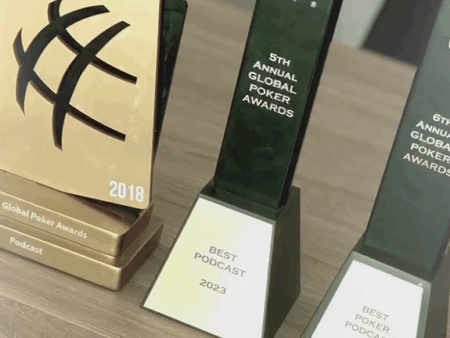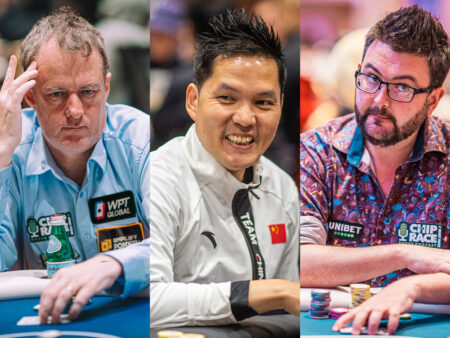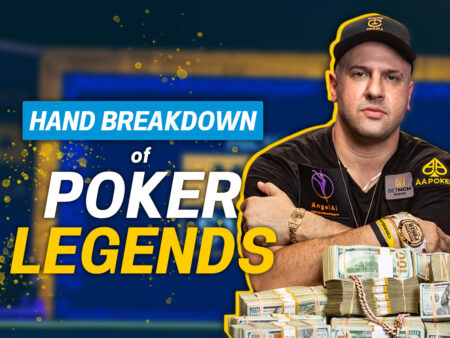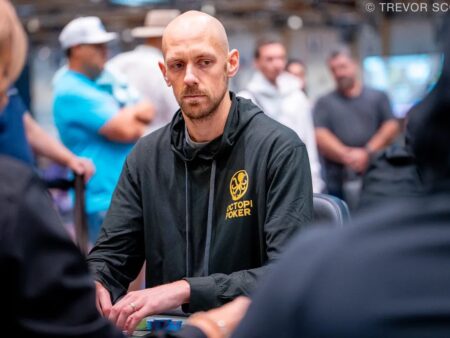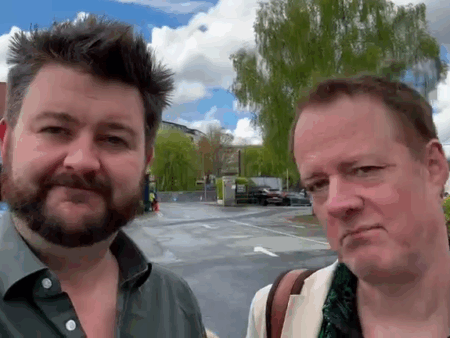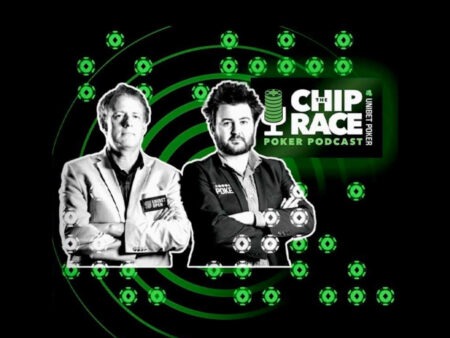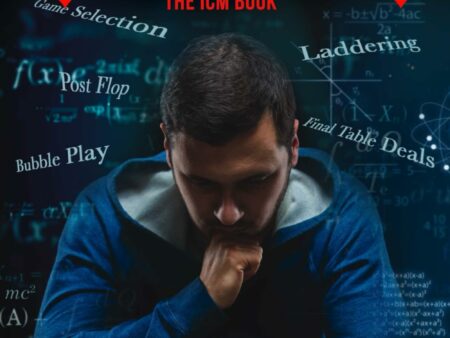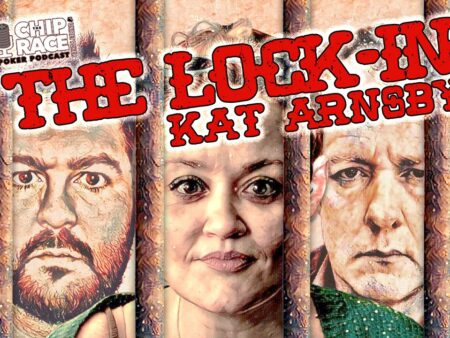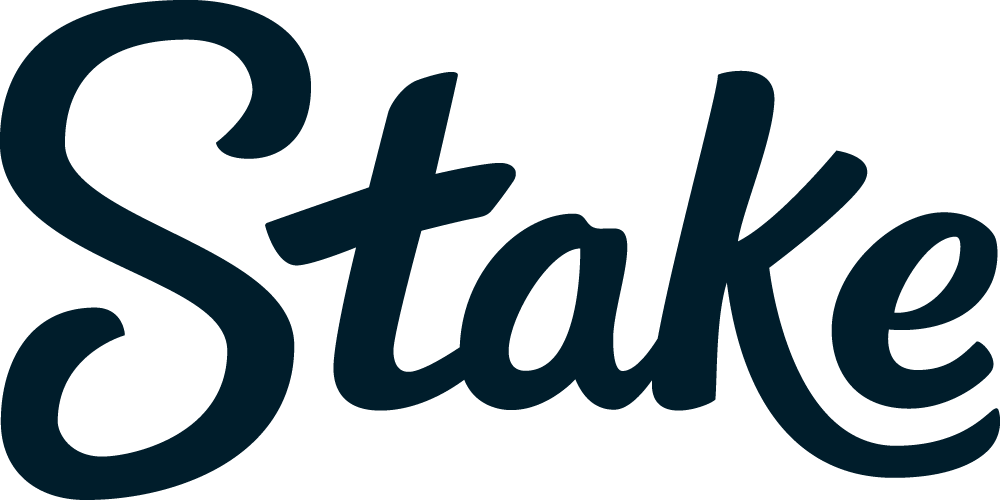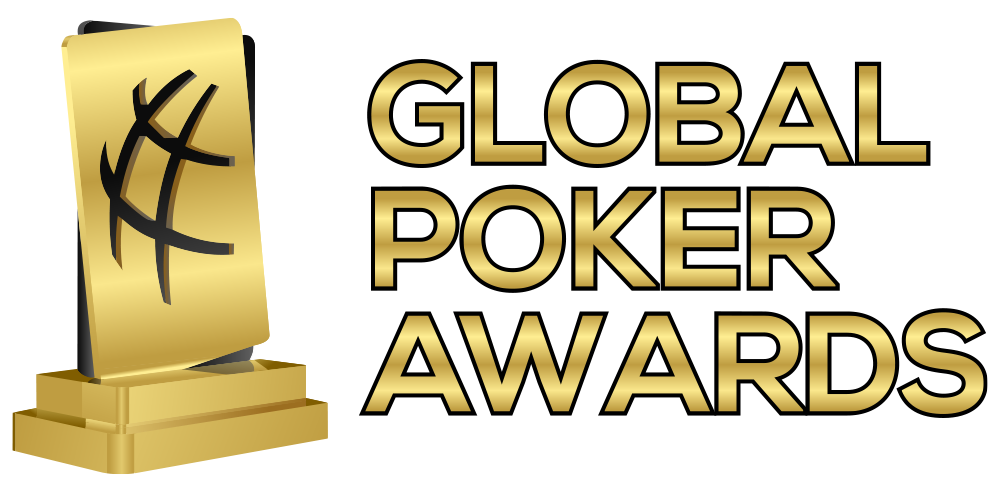The final episode of Season 26 of The Chip Race has aired and is on course to being one of the most listened-to episodes of the award winning poker podcast.
Joining hosts Dara O’Kearney and David Lappin in S26, Episode 7 were high stakes beast Stephen Chidwick, Cypriot rising start Andrea Mavromoustakis and poker journalist Craig Tapscott. It’s one of the most thought provoking episodes the Irish duo have put together in the history of the show, tackling the often taboo issue of mental health in the poker world.
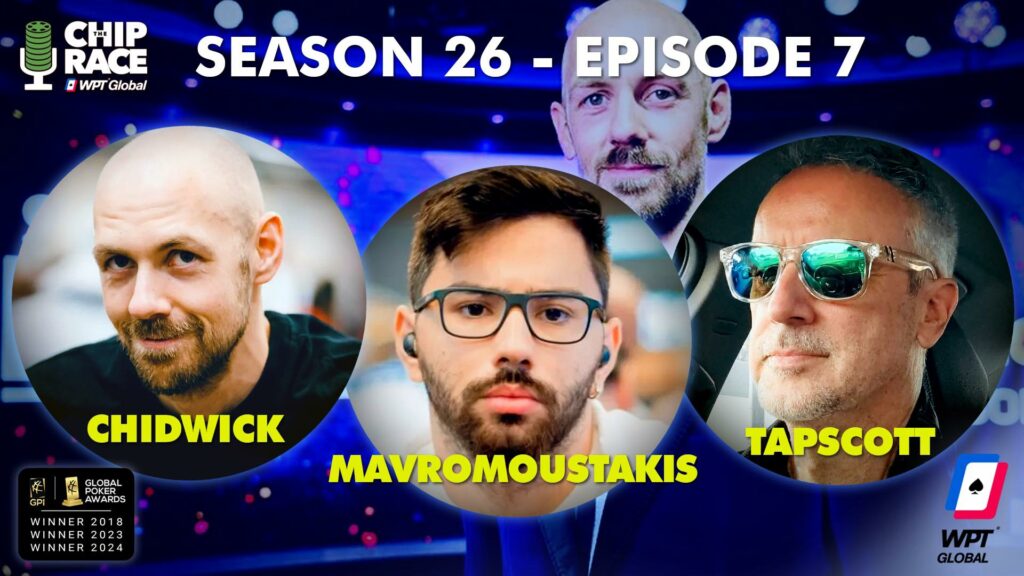
We’ll get into a bit more detail about what they spoke about shortly. “But first” (say that out loud to yourself in an Irish accent, for the full The Chip Race experience), let’s talk a little about the show itself.
What is The Chip Race Podcast?
The Chip Race is the long running poker podcast, fronted and produced by Irish pros David Lappin and Dara O’Kearney, ably assisted by Barry Carter, who delivers the news segment. There are usually three or four guests per show and they have a knack for securing big names.
The podcast’s willingness to tackle taboo topics is a hallmark of its authenticity and while the hosts can at times be heated and partisan with their views, they do tend to address controversial issues from both sides of the argument.
Editorial independence is something that The Chip Race podcast has always been afforded by its sponsors and no topics are off-limits. While it’s usually quite a jovial show, it regularly tackles difficult issues and the presenters do a good job of balancing entertainment with more serious conversation. The popularity of The Chip Race has been well-recognised by the poker community, with the show winning the Best Podcast at the Global Poker Awards an unprecedented three-times, including back-to-back wins in the last two years.
- Read more: 6th Global Poker Awards

End of an Era
For most of The Chip Race’s decade long existence, it was sponsored by Unibet Poker, with Lappin and O’Kearney also becoming ambassadors of the online site.
But in spring 2025, the lads broke the news that their long-standing relationships with Unibet Poker was coming to an end. It wasn’t acrimonious, there hadn’t been a bust up and there’s absolutely no truth in the rumour that Unibet simply couldn’t cover the rising expense of David’s fried chicken habit any longer. It had been a great innings and everyone had been happy with the association, but it had run its course and it was time for Unibet to rejig its marketing approach, with The Chip Race becoming surplus to that requirement.
WPT Global Become New Sponsors
O’Kearney and Lappin closed the Unibet era with a warning that the show’s continuation wasn’t guaranteed. But that turned out to be a false harbinger of doom, as it didn’t take long for a new sponsor to step out from the shadows.
- Read more: The Chip Race Rebuys?
Soon after the Unibet association ended, WPT Global was unveiled as the new sponsor of The Chip Race, ensuring the continuation of one of poker’s most beloved podcasts. WPT Global is not available in all markets yet, but Ireland is one of the key countries in Europe where it does have a presence, making The Chip Race a good fit for the brand.
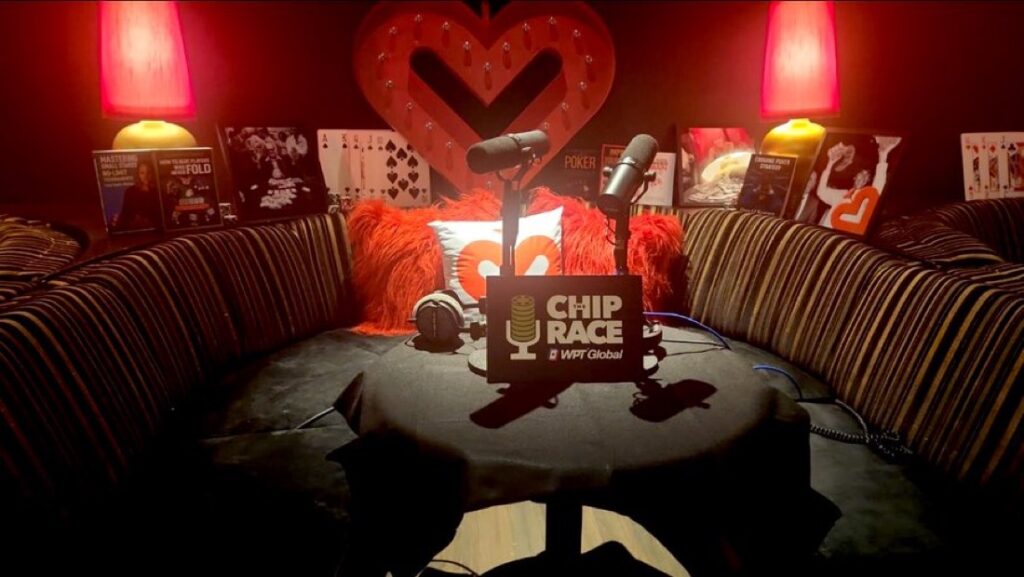
Final Episode of the Season
The first full season they have produced with WPT Global as the sponsor has now concluded, with a great line-up for the final episode, headlined by a rare media appearance by Stephen Chidwick. The UK pro is the second most-winningest player in the history of live poker, with $74m in tournament winnings. He recently scored big at Triton Jeju, adding over $5m to his net worth, but his recent success wasn’t the focus of the discussion.
Chidwick has been a very private person for most of his poker career, but recently opened up, posting on X for the first time only in July this year. In his introductory post, he revealed that he has suffered with mental health issues at various points in his life at the tables.
It’s a subject that rarely gets discussed in the poker community, but has recently been highlighted as a topic by Craig Tapscott, in an ongoing series of articles for Poker.org.
Guest 1: Craig Tapscott
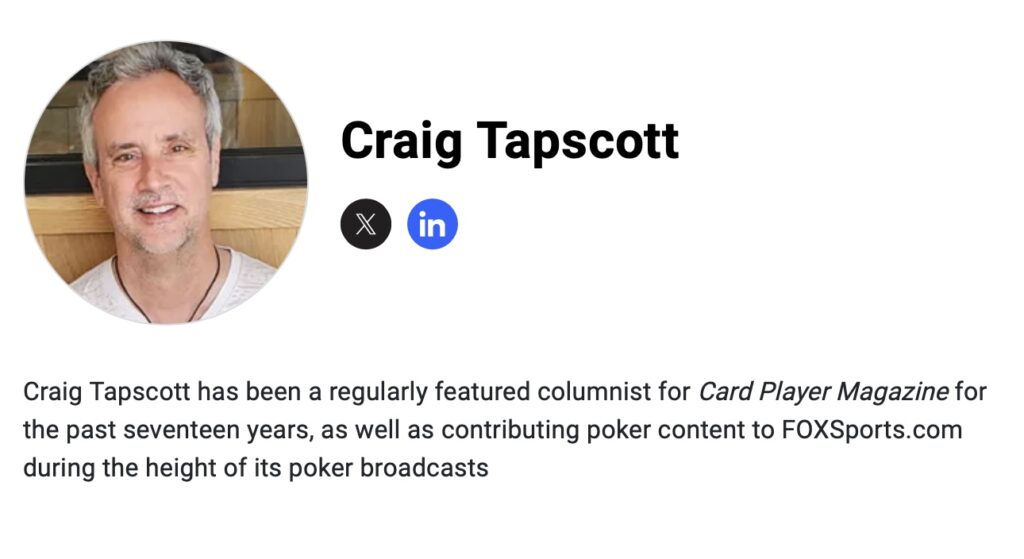
It was therefore very fitting that the first guest on the episode was Craig Tapscott, with whom Dara and David had a frank and open discussion about mental health factors, that can and do impact many poker players’ lives.
Tapscott told The Chip Race that he had been considering writing a series for over a year, after having discussions with Brad Rubin, a player who had publicly opened up about his own mental health issues. He became acutely aware of many players having such issues, with the high-profile incident involving Tom Dwan inspiring him further.
Tapscott already knew Chidwick and the high-stakes pro had reached out to him for advice prior to his X debut. Craig saw the positive response from the community to Chidwick’s post and knew it was the right time to start the series, which included an in-depth interview with the high-stakes player.
While most people keep mental issues bottled up, in his opening article in the Poker.org series, Tapscott warns:
“The consequences of neglecting mental health in poker can be devastating.”
Lives can be turned upside down by such issues, causing depression, financial ruin, a break-down of friendships and familial relationships. In more extreme cases, self-harm and suicidal thoughts can also arise. Tapscott urges players to focus on their mental well-being and incorporate that into their routine, in addition to their usual preparations and study of the technical aspects of the game.
Tapscott explained that the main reason why most people are unwilling to open up about their issues is due to not wishing to appear vulnerable, or weak. Poker is a game in which players will exploit any weaknesses they see in their opponents and therefore most choose to maintain a poker face when it comes to their own state of mind.
It was an interesting discussion, that also touched on coping mechanisms such as forced amnesia, a subconscious method that some players adopt in order to deal with big losses. As an interlinked story, it served as the perfect warm-up act for the Chidwick interview, but it was not yet time for the main course.
Guest 2: Andreas Mavromoustakis
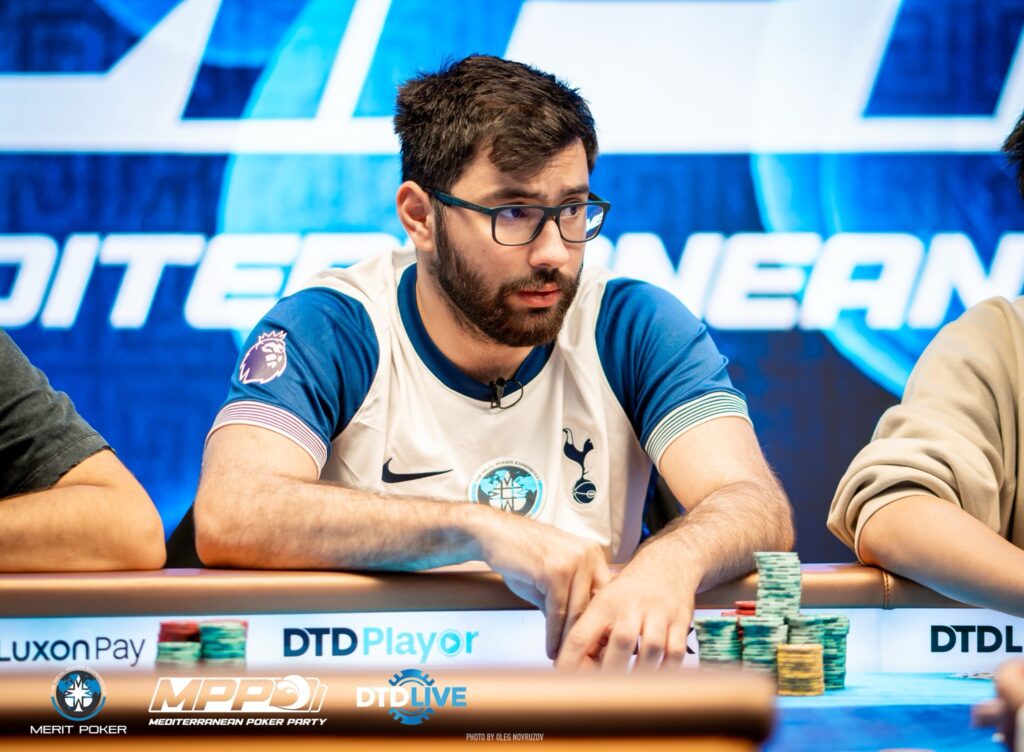
If Tapscott was the perfect appetiser, the next starter was also a mouth waterer, as rising Cypriot poker star Andreas Mavromoustakis was next in the hot seat.
Although only 25-years old, Mavromoustakus speaks like someone with a lot more experience. Online he plays high stakes, but until recently, most of his live sojourns had been to low and mid stakes festivals. However in May he chopped the $5k Main Event of the Mediterranean Poker Party in Cyprus, just 40 minutes drive from his home.
Dara and David became friends with Andreas in 2022, when he erroneously attended the Dublin Poker Festival, mistakenly believing it was the Irish Open. At that time, when he began venturing into the live poker arena, he was already an online crusher, playing MTTs with buy-ins as big as $5k, but opted mostly for sub-€1k live buy-ins, taking part in events like The Battle of Malta.
The 3-way chop in Cyprus earlier this year netted him his biggest win to date and his payout of €651k, is the biggest live win ever for a Cypriot National. It also elevated him to 7th place on the all-time money list for Cypriots.
It was a lively discussion, beginning with his journey from discovering the game as a teenager, playing as a student, then dropping out of college to play full-time as an online pro. Short stack ninja skills were included in the conversation, a skill set that hosts Dara and David are very familiar with. On this matter, Mavromoustakis spoke of the need to master short-stack play to succeed online, especially at sites such as GG Poker, where due to the structure of the large field MTTs, most players spend the majority of their time below the average stack.
He talked about his plan to move up in stakes, but won’t be jumping straight into events like Tritons, preferring to gain further experience at higher stakes online and on live tours like the EPT, before progressing to the upper echelons of the poker world.
Speaking about staking, he made a cautionary statement about what would happen if he were to become staked to play poker. He believes if he were to do that, his poker career would be over and it would just become a hobby for him. While many might take the short-cut of getting backed to move up the stakes, he doesn’t believe this to be the right approach, explaining:
“I believe that to win at poker on a high level, you need to be a little bit of a psychopath and a gambler. You need to take these shots and try to play with your own money.”
He qualified this further by saying:
“I know a lot of people who got into huge make-ups, even good players, and then just play horribly because they feel pressure (to recover the money they lost)….If you play your own money, it’s your responsibility, the only one you need to account for is yourself.”
Wise words for someone so young who is working his way up the poker ladder. Andreas Mavromoustakis is certainly one to watch the progress of, over the next few years.
Mavromoustakis also stuck around for the strategy section of the show, which came after a news interlude, presented in his usual sardonic manner, by the award winning Barry Carter, poker’s most revered meme-artist. Then the attention turned to the headline act, the UK’s greatest ever poker player (sorry Benny, he’s got you covered), Stephen Chidwick.
Guest 3: Stephen Chidwick
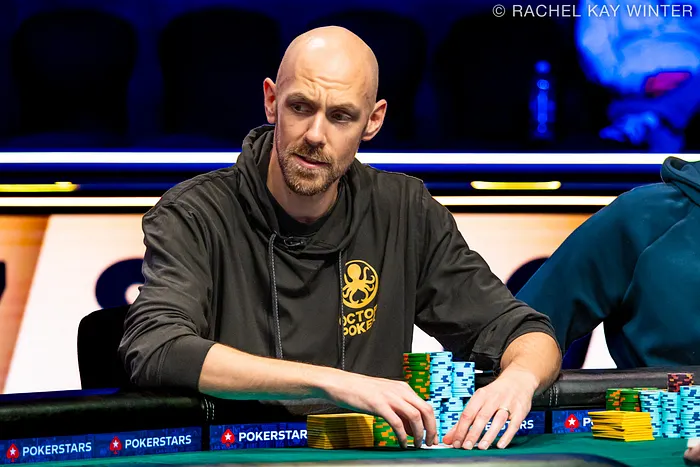
Stephen Chidwick has been a crusher for the majority of the time he’s been playing the game. He rose to prominence in 2008, his first full year playing, making several significant online scores. These were recognised by the community and he was nominated for the Rookie of the Year award at the 2008 European Poker Awards, but lost out to Russian Ivan Demidov.
For the next decade and a half, Chidwick remained largely an enigma, a highly successful British player, but not central to the UK poker community. He played in games much higher than most UK players and apart from a few early appearances at mid-stakes events in the late noughties, was rarely seen at British poker venues.
He didn’t have double page spreads written about him or do in-depth interviews in the glossy poker magazines of the time, yet he was competing in far bigger events than almost any other Brits were…and he was winning. Although he’s been a consistent winner throughout his career, most of his big successes have come in recent years, on the Poker Go Tour, The Triton Super High Roller Series and the World Series of Poker.
In the first half of the interview Chidwick told the story of how he became obsessed with poker at an early age, spoke of his grinding routine in the early days and his success playing online satellites to live events, which he mostly never attended. One year he won over 100 packages to the WSOP Main Event on PokerStars, but was still too young to play in the event.
He also spoke about downswings and how he dealt with them and of course there was much discussion about GTO and his training site, Octopi Poker, telling The Chip Race:
“I definitely do credit early adoption of modern tools as being a big reason why i got to the highest level.”
On the subject of GTO v exploitative play, Chidwick admitted he is asked this question a lot, responding;
“To me, it’s kind of a false dichotomy where I don’t think anyone’s really trying to use one or the other. Using the theory to inform the real hands is the goal.”
Chidwick’s preference for living a private life has led some to ungenerously describe him as robot. While he certainly isn’t much of table talker, he recently decided to open up and reveal more about himself, starting with his very first X post, back in July. In that post Stephen talked about the fact that he’s been a private person and his reasons for that preference, admitting he had struggled with mental health issues at various points in his life.
He expanded further on the topic of mental health in his appearance on The Chip Race, saying:
“It’s a topic that’s quite close to me, something I’ve struggled with a lot in the past in various ways and its something I see in a lot of my friends and actually just most of the people I know”.
Objectively, he’s one of poker’s most successful players, sitting in second place on the all-time money list. Many believe he will soon assume the number one spot and is considered the front runner to be the first player to book £100m in live cashes. David brought this up and asked him separate questions about what leaving a legacy behind means to him and why, after so many years of being a private person, does he now have a desire to be known?
Chidwick’s answers made perfect sense, when juxtaposed against his recent admission of mental health issues.
“I have got a lot of motivation out of it, but at the end of the day, it doesn’t mean a whole lot, especially this all-time money list.”
He spoke about how rankings and leaderboards have been a big motivation for him in the past, but having achieved most of his poker goals, it’s time to focus on other areas of personal growth, such as developing himself socially, becoming more charismatic and better at public speaking.
While his approach in the past had been to shy away from interviews, he explained that one of his goals from becoming better known is to be a role-model and have a positive influence on others. He’s been in dark places himself, recognises it in others and by opening up about it publicly he can draw attention to these issues.
Although it was never really in doubt, its refreshing to know that Chidwick’s future as a more public persona is unlikely to involve him bragging about how many bracelets he has won, how much he has banked or how much better he is than blah blah blah. Hellmuth and Negreanu already have that public poker persona space cornered, they can keep it. Chidwick’s approach is much more classy. He may not be able to ‘get it quietly’ any more, but he will still continue to accept his wins in a very graceful manner.
It’s a fascinating listen and worth hearing the entire segment. I urge readers to do so as although I’ve covered quite a few of the topics of discussion, I’ve deliberately left out some of the best bits. It can be found at SoundCloud along with all the other Season 26 episodes.

Photos Courtesy of The Chip Race, WSOP, Merit Poker and Poker.Org

